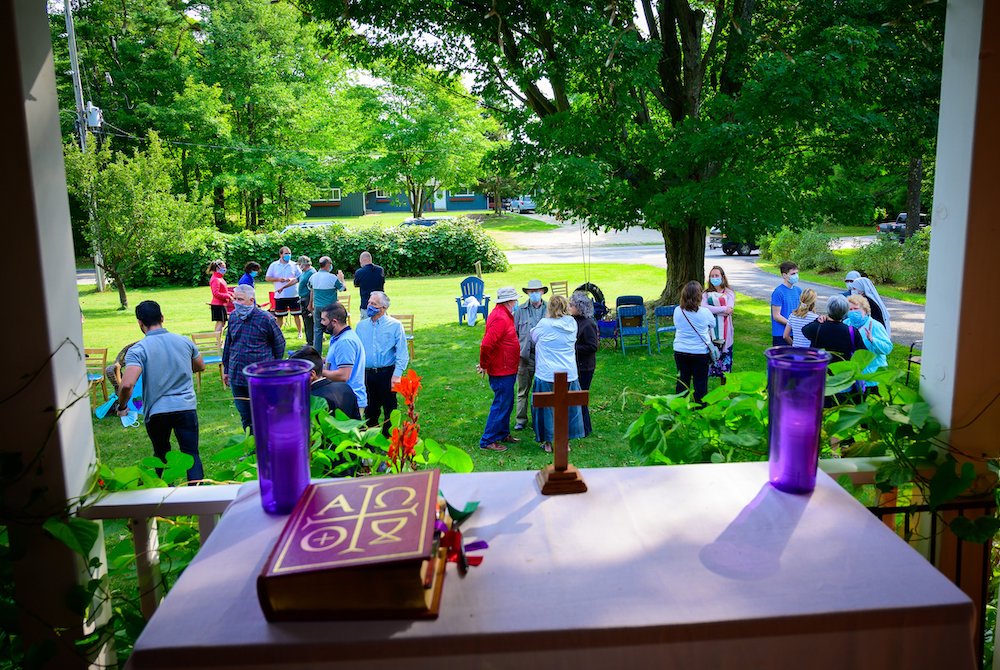
People spend time in conversation following the outdoor Mass at the home of Larry and Diane Kahlscheuer on Washington Island, Wisconsin, Sept. 6. (CNS/The Compass/Sam Lucero)
On Aug. 31, the Catholic bishops of Wisconsin announced an end to the dispensation from the obligation to attend Sunday Mass, issued in March because of safety concerns related to the coronavirus pandemic.
But before the lifting of the dispensation could be implemented, the number of cases skyrocketed to the state's highest rates since the pandemic began. On Sept. 19, Wisconsin reported a 19.4% positivity rate. (A positivity rate of 5% is considered a threshold for safe reopening.) A few days earlier, the University of Wisconsin at Madison announced it was cancelling spring break in an effort to curb spread of the virus.
On Sept. 16, data listing the top 20 U.S. cities with the fastest growing number of COVID-19 cases featured eight Wisconsin ones: 40% of the country's hotspots were in one state. (That number has since decreased to five cities out of 20, as rates grow in other places).
While we understand the strong desire of Catholics to return to their faith communities, church leaders must listen to the scientific and medical data. It's too early to lift the Mass dispensation and encourage more people to return to in-person services.
We all want to get back to normal, and that includes a more normal participation in the sacraments. Being unable to receive the Eucharist is particularly painful since it is the "source and summit" of the Christian life.
And, as a recent poll indicates, having a high percentage of Catholics — especially young people, at 36% — who plan to attend Mass less frequently after the pandemic will clearly hurt parishes with already declining participation and financial giving.
But, as NCR has editorialized throughout the pandemic, resumption of religious services cannot come with such a risk to people's health, and indeed their lives, especially as the country moves into winter and fall, when experts predict the spread of the virus will increase.
Milwaukee Archbishop Jerome Listecki said as much in his letter detailing the lifting of the ban in that archdiocese.
Listecki said Catholics could continue to miss in-person church services if they are at risk because of age, underlying medical conditions or a compromised immune system, or to care for a sick person.
Advertisement
But, according to the archbishop, general fear of getting sick was no longer an acceptable reason to miss Mass. Catholics who "deliberately fail to attend Sunday Mass commit a grave sin,” he said.
This language — unpersuasive to many, even before the pandemic — will nonetheless pressure some Catholics to take unnecessary risks.
Even more alarming is a report that in at least one Wisconsin diocese, the Green Bay Diocese, churches also will no longer have to restrict the number of people who can come to services, as long as church-goers can maintain proper social distancing.
Most Catholic churches have taken appropriate precautions to make in-person services as safe as possible, including requiring masks, banning singing and limiting the number of attendees. Backtracking on those precautions before rates stop climbing is irresponsible.
Churches that do follow strict safety protocols should not be unfairly penalized, however. In San Francisco, other establishments — including indoor malls and museums, and, as potentially as of Oct. 1, indoor-dining at restaurants — are allowed up to 25% capacity. (Admittedly, a brief visit to a mall or a museum, where patrons are less likely spend prolonged time in close proximity to other people is less risky.)
Churches in San Francisco have been limited to outdoor services, with buildings only open for individual prayer. The mayor's plan to re-open churches as of Oct. 1 has a cap of 25 persons — likely less than 25% capacity for most church buildings in the archdiocese. While San Francisco Archbishop Salvatore Cordileone may be overstating the level of conspiracy on the part of the government, churches need to be treated fairly in reopening plans.
But let's not get ahead of ourselves and completely lift Mass dispensation orders, especially in states where cases are still dangerously high.





